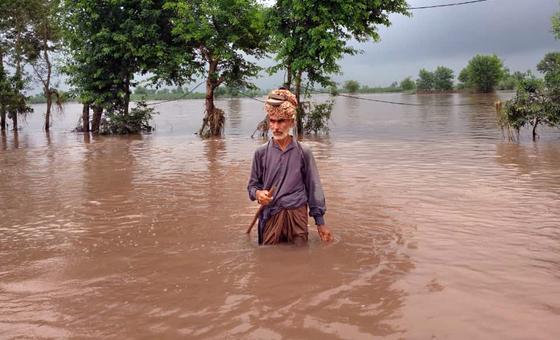Global Challenges: Pakistan Floods, Climate Reporting Gaps, and Peacekeeper Safety Concerns
Environmental reporter focusing on climate change, conservation, and sustainability

In a week marked by natural disasters, geopolitical tensions, and financial constraints, the United Nations has highlighted several pressing global issues. As Pakistan grapples with devastating floods, climate reporting lags in numerous countries, and attacks on peacekeepers in Lebanon raise alarms, the international community faces an urgent call to action.
The recent floods in northern Pakistan have left a trail of devastation, with Secretary-General António Guterres expressing deep sorrow over the loss of life and widespread destruction. The death toll has risen above 400, and around 1.5 million people have been affected by the severe monsoon-induced calamity, exacerbated by climate change. The Pakistani authorities' swift action in relocating over a million people in Punjab has been commended. However, the need for humanitarian aid remains critical, as over 3,000 homes, 400 schools, and 40 health facilities have been damaged. The UN and humanitarian organizations are actively assessing the impact and addressing response gaps, with $600,000 already allocated for relief efforts.
In the realm of climate action, UN Climate Change Executive Secretary Simon Stiell has raised concerns over the failure of 37 countries to submit mandatory reports under the Paris Agreement’s transparency framework. Speaking at the Global Transparency Forum in Korea, Stiell emphasized the importance of the Enhanced Transparency Framework (ETF) as a tool for driving stronger climate action. The ETF not only facilitates investment and policy design but also enhances trust and progress on clean energy initiatives. With over 100 nations having submitted their Biennial Transparency Reports, the upcoming global synthesis report will provide critical insights into mitigation and adaptation progress ahead of COP30 in Brazil.
Meanwhile, in Lebanon, the UN has voiced serious concern over a recent Israeli drone attack on peacekeepers of the UNIFIL mission. The incident, which involved grenades being dropped near personnel clearing roadblocks, marks a significant breach of the cessation of hostilities agreement with Hezbollah. The attack, described as one of the most severe since the agreement, highlights the ongoing volatility in the region. Secretary-General Guterres has condemned any actions that endanger peacekeepers, urging all parties to ensure their safety and the inviolability of UN premises.
The Human Rights Council is also facing challenges as funding cuts threaten to undermine its investigative and advisory capacities. President Jürg Lauber has warned that financial constraints could limit the Council's ability to support Special Rapporteurs and independent investigators. These cuts may affect the Council's ability to conduct research, travel for investigations, and offer technical support to governments. The potential impact on the Council's effectiveness in addressing global conflicts and human rights issues is a growing concern.
As these global issues unfold, the UN's role in coordinating and supporting international efforts to address natural disasters, climate change, peacekeeping, and human rights remains crucial. The challenges highlighted this week underscore the interconnected nature of global problems and the need for a collaborative, well-resourced response. Looking ahead, the international community must prioritize sustainable solutions and robust support mechanisms to address these pressing challenges effectively.
About Anna Green
Environmental reporter focusing on climate change, conservation, and sustainability